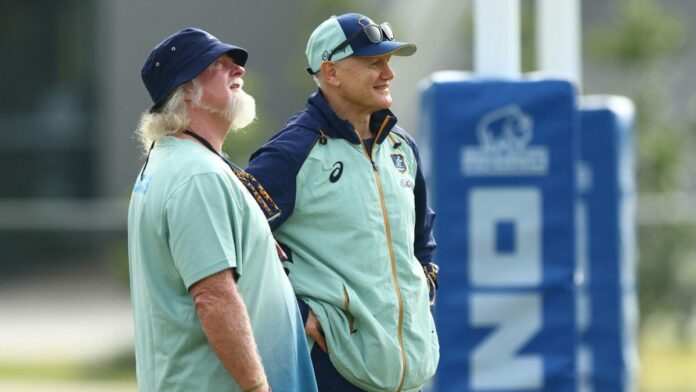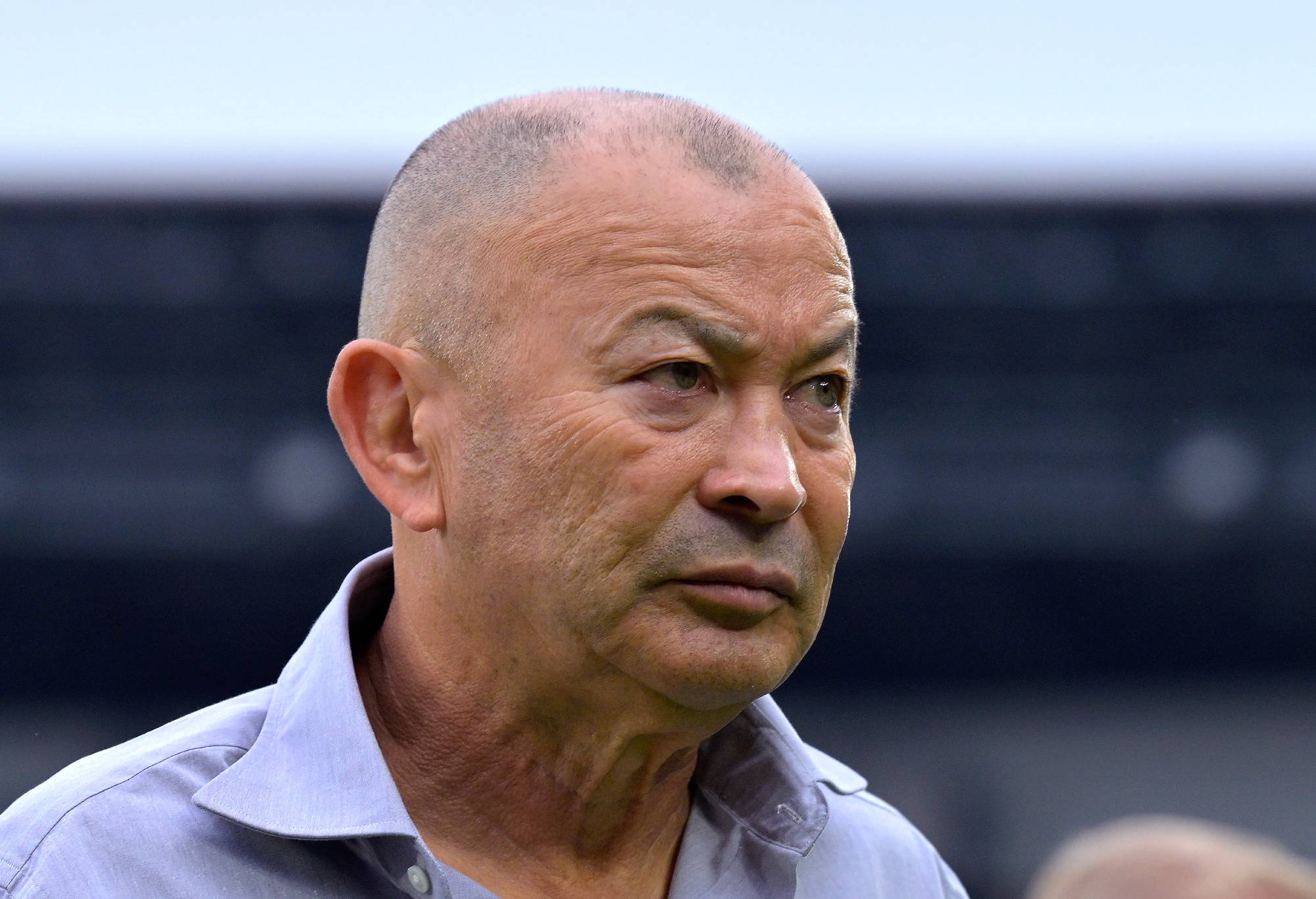
[ad_1]
Laurie Fisher says Joe Schmidt has made an “enormous difference” in less than 12 months as Wallabies coach and believes Australian rugby will benefit immensely if the New Zealander decides to continue in the role beyond next year’s Lions series.
After The Roar first reported that Schmidt was strongly considering calling time on his brief tenure next year, the respected coach revealed last week that he would decide whether to stay on with the Wallabies beyond next year’s crucial series by the end of the year.
His comments would not have surprised Rugby Australia officials, who have been eager to know his movements for months, but they would have sent shivers down the spines of Wallabies fans desperate for continuity and stability.
Indeed, after years of chaos that reached its zenith at last year’s World Cup, Schmidt’s understated, self-deprecating and reassuringly dry tone has been tonic for a fed-up rugby nation just wanting to see hard work and progress on the field.
It’s why Fisher is hopeful his boss stays on.
“Well, I think it would be great for Australian rugby,” said Fisher, after being asked how significant it would be for Australian rugby if Schmidt re-signed beyond the Lions.
“He’s a class act and he’s making a huge difference. But he’s got other things and he’ll make decisions around whatever’s happening in his life. So whichever way it goes, I’d wish him all the best. But in the short period that he’s been here, I think he’s made an enormous change for the better.”
For Fisher, the doyen of Australian rugby coaching, who enjoyed stints at Munster and Gloucester around long hauls at the Brumbies, the widely respected mentor said he had thoroughly enjoyed working alongside Schmidt after coaching against him in Ireland.
“It’s been really good,” Fisher said. “I’ve known Joe for a long time but never coached with him previously. And he really is a great guy to work with.
“He’s got an insane amount of knowledge about all aspects of the game. He’s got a great manner with his staff and with the players. And he’s got a great eye for detail on the pitch, and that’s something that we’re all chasing to be better at.
“He sees things in the moment, which is what makes him a better coach than most. You don’t waste time going back and reviewing and seeing stuff that you shouldn’t have been doing. His eye for detail and his ability to coach in the moment is second to none.”
Fisher and Schmidt at Wallabies training. (Photo by Matt King/Getty Images)
Asked where Schmidt has made the biggest difference, Fisher said it was the New Zealander’s relentless pursuit to do the basics well and not “reinvent the wheel”.
“Like all coaches, he’s got a real focus on the fundamentals of the game, on doing the simple thing well. But what he does better than most is he coaches that and he sees that and he doesn’t let it drop off,” Fisher said.
“So, the things that prop your game up, the bedrock of your game, he just hammers away at that.
“He also understands oppositions strengths and weaknesses and where he can attack.
“I like the fact that we’re not reinventing the wheel each week. It really is about us and how we play and fine-tuning our game and getting better at our skill sets and our understanding.
“I think that’s what the players enjoy. It’s not incredibly complex, but it’s challenging, it’s challenging to your skill set, and I think that’s what players like because they know what they’re supposed to do. They just have to get out there and get better at doing it.”
That approach is a contrast to what Schmidt’s predecessor wanted to achieve.
Indeed, Eddie Jones, during his final year in charge of England, one year at the Wallabies, and, now, his second tenure with Japan, has sought to play with breathtaking speed by running teams off the park.
Thus far, it’s not yet worked.
Although the playing group at last year’s World Cup largely thought that Jones had fostered an environment of positivity, by the end of it they had lost faith in his direction.

(Photo by Koki Nagahama/Getty Images)
Quickly, however, Schmidt has resorted that faith, and it’s something that he was eager to address from the outset.
“I know Joe from day one said that he sought permission to be 100 per cent honest with the group about what they did well and what they’re not doing well,” Fisher said.
“Players always say, ‘Give me the truth, give me both barrels,’ but they don’t necessarily mean it, I don’t think.
“We’ve got a generally good group of players and Joe is honest with them about what we’re doing well and what we’re not doing well.
“As a player and as a coach, you’re looking for growth. The wins are nice, but where we started off, we wanted to grow our game, and part of growing your game is you’ve got to turn up seven days a week and you’ve got to enjoy what you’re doing. It can’t be a chore, it’s got to be challenging, but it’s not a chore.
“Joe and all the staff have created an environment that is challenging. We are getting better and we’ve had a couple of wins come our way, so all those things help the environment.
“I haven’t been in a rugby environment where there weren’t great people, and we’re no different to anywhere else.”
So how has the reaction been to last week’s disappointing 27-13 loss to Scotland, where the Wallabies missed 34 tackles and gave away 14 penalties?
“We tackled it 86 per cent in the first half, which is a pretty solid day out,” Fisher said. “We definitely fell off in the second half.
“It wasn’t a big ball and play game, but I think we had a couple of long passages of D [defence]. They came from all over. We missed on edge, we had some poor tracking, we didn’t hustle high through the midfield and let guys step us back on the inside, we inexplicably let some guys go like Darcy Graham on the halfway line that results in a try.
“It was one of those days where we just weren’t smooth and connected in what we were doing. Then we had guys jumping out of the line trying to make a difference and that just creates opportunities either side of them. We just lost a little bit of our composure.
“The penalties, sometimes they can go each way.”
Fisher believed called up flanker Carlo Tizzano was harshly penalised, but admitted ultimately the Wallabies weren’t good enough.
“We didn’t play well enough,” Fisher said. “We didn’t execute our attack smoothly. They defended exceptionally well, shut us down. I think you’ve got to give credit to the Scots in how they played.”
So how will the Wallabies mount a challenge against Ireland, the world No.2 side?
“There’s no real weaknesses,” the former Munster coach said. “You’re not one of the top sides of the world for the last eight years if you’ve got too many weaknesses.
“Our challenge will be to turn up, put them under pressure, try and bang the door down for as long as we can and see where we end up.”
[ad_2]
Copyright for syndicated content belongs to the linked Source link

